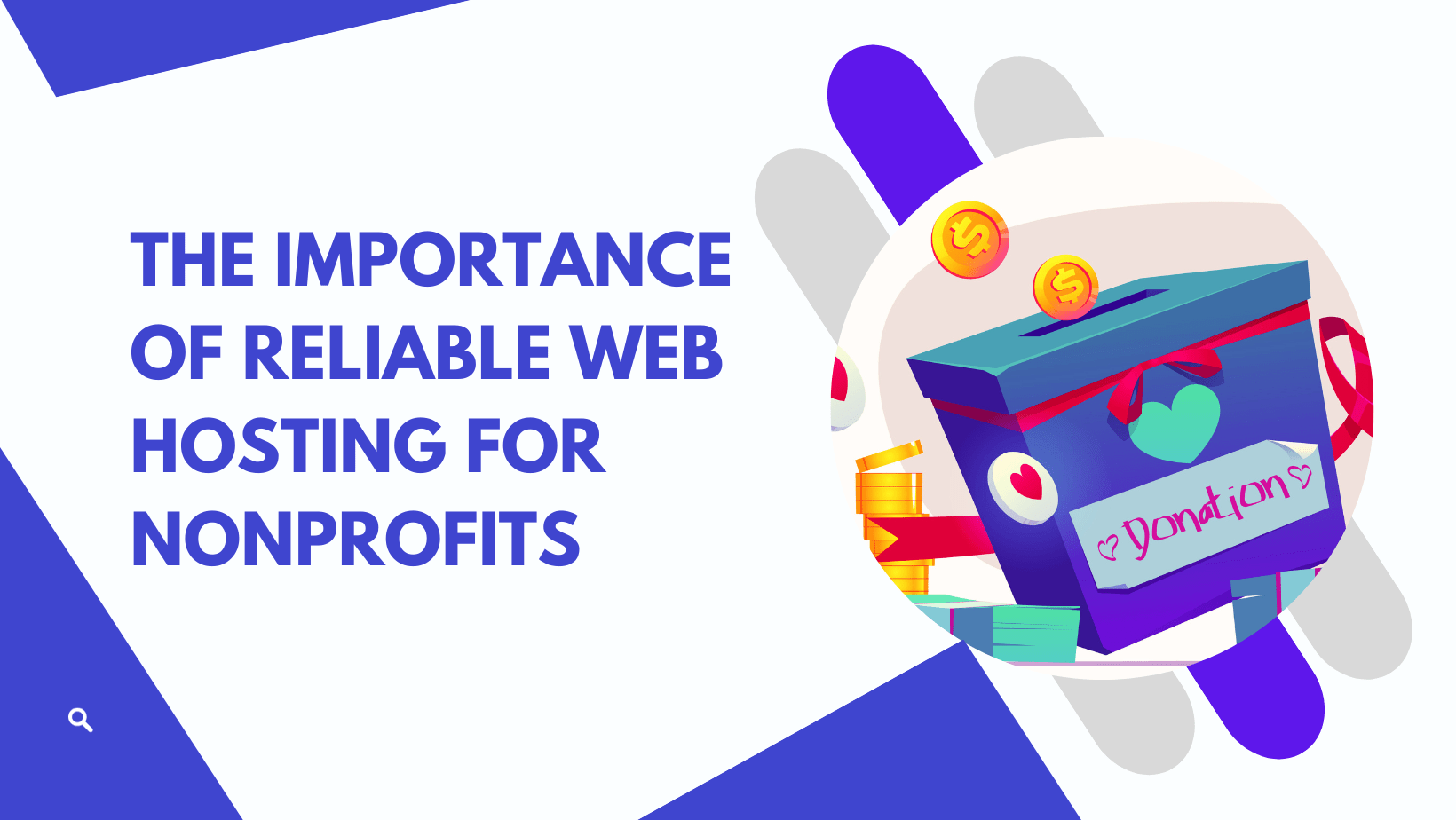The Importance of Reliable Web Hosting for Nonprofits

Imagine the excitement and anticipation leading up to the final hour of a critical online fundraising event for your nonprofit organization. Supporters from across the globe are eager to contribute to your cause. But suddenly, your website crashes, leaving potential donors frustrated and unable to support your mission. This nightmare scenario is a sobering reminder of the importance of web hosting for nonprofits.
In today’s digital world, a nonprofit’s website is its primary interface with the world, making web hosting a secret weapon for achieving its mission.
Why Nonprofits Need a Strong Online Presence
Nonprofits are incredibly diverse, ranging from charitable organizations to advocacy groups, educational institutions, and more. While their missions vary widely, they all have one thing in common: the need for a strong online presence.
In today’s interconnected world, a website is often the first point of contact between a nonprofit and its supporters, volunteers, and beneficiaries. It’s the hub for sharing stories, collecting donations, rallying volunteers, and advocating for change.
The Web Hosting Essentials for Nonprofits
When choosing a web hosting provider, nonprofits should consider their specific needs and budget. Here are a few key factors to keep in mind:
1) Types of Web Hosting for Nonprofits:
Nonprofits have several options when it comes to web hosting, including shared hosting, VPS hosting for nonprofits (Virtual Private Server), dedicated hosting, and cloud hosting for charities. Each has its own benefits and drawbacks, making it crucial for nonprofits to choose the right one based on their specific needs and budget.
2) Security for Nonprofit Websites:
Nonprofits deal with sensitive donor information, so security for nonprofit websites is paramount. Best web hosting provider like KemuHost offer robust security measures, including SSL certificates, firewalls, and regular malware scans, to protect this data and maintain trust with donors.
3) Reliability and Uptime for Nonprofit Websites:
Nonprofit website uptime guarantees matter. A reliable web hosting provider ensures that a nonprofit’s website is available 24/7. Downtime not only frustrates supporters but can also result in lost donations and opportunities.
Case Studies: Hosting Success Stories
To illustrate the impact of reliable web hosting, let’s look at some real-life examples:
- Charity A: After migrating to a KemuHost for nonprofits, Charity A experienced a 99.9% uptime rate. This stability allowed them to run successful year-end fundraising campaigns, exceeding their goals.
- Advocacy Group B: Advocacy Group B, dedicated to climate change awareness, moved to a green hosting provider for charities. Not only did this align with their mission, but it also attracted environmentally conscious donors who appreciated their commitment to sustainability.
These examples highlight the tangible benefits nonprofits can gain from quality hosting services.
The Cost of Downtime
Downtime is any period of time when a website is unavailable to visitors. It can be caused by a variety of factors, such as technical problems, server outages, and cyberattacks.
Downtime can have severe consequences for nonprofits. Financially, it can result in lost donations and damage to their reputation. Imagine a potential donor visiting a nonprofit’s website during downtime. Chances are, they won’t return. According to a study by the Atlassian, the average cost of a minute of downtime is $5,600. For nonprofits, that cost could mean the difference between funding a critical project or falling short.
But downtime isn’t just about dollars and cents. Nonprofits rely on their websites to spread awareness, engage volunteers, and advocate for change. Downtime disrupts these activities and can have long-lasting consequences for their missions.
For example, a nonprofit that is trying to raise awareness about a social issue may not be able to reach its target audience if its website is down. A nonprofit that is trying to recruit volunteers may not be able to fill its open positions if its website is unavailable. And a nonprofit that is trying to advocate for policy change may not be able to get its message heard if its website is down.
That’s why it’s so important for nonprofits to invest in web hosting. Reliable web hosting providers offer a variety of features and services to help nonprofits keep their websites up and running, even in the event of unexpected problems.
Finding the Right Hosting for Nonprofits
Choosing the right web hosting for nonprofits is a big decision, especially with limited budgets and technical expertise. Here are a few factors to keep in mind:
- Affordability of hosting for nonprofit organizations: Nonprofits often operate on tight budgets, so cost is a major factor to consider. Many hosting providers offer free website hosting, discounts or special plans for nonprofits, making it more affordable to access high-quality hosting services.
- Scalability for Nonprofits: As nonprofits grow and their online presence expands, they need web hosting that can scale with them. Look for providers that offer scalable solutions to accommodate increased website traffic and data storage needs.
- Support for Nonprofit Websites: Nonprofits may not have in-house IT teams, so having reliable technical support from their hosting provider is essential. Choose a provider that offers responsive and knowledgeable customer support.

Web Hosting and Nonprofit Missions
A nonprofit’s website is more than just a digital brochure. It’s the engine that powers their mission, allowing them to reach a wider audience, raise funds, recruit volunteers, deliver programs, and report on their impact.
A very good web hosting is essential for nonprofits to achieve all of these goals. It ensures that their websites are always available, secure, and performing at their best.
Here are some of the specific ways that web hosting impacts different aspects of nonprofit work:
- Outreach and awareness: Nonprofits use their websites to spread the word about their mission and work. With reliable hosting, they can reach a wider audience through search engines, social media, and email marketing.
- Fundraising and donation processing: Donors need a secure and smooth online experience when making contributions. Reliable hosting ensures that the donation process is seamless and that donor data is protected.
- Volunteer recruitment and engagement: Nonprofits use their websites to recruit volunteers and keep them engaged. Reliable hosting supports volunteer sign-ups, event registrations, and communication with supporters.
- Program delivery and impact reporting: Nonprofits use their websites to share updates on projects, report on their impact, and engage with beneficiaries. Reliable hosting keeps these critical functions running smoothly.
Security and Data Protection for Nonprofit Websites
Nonprofits often handle sensitive information, such as donor names, addresses, and credit card numbers. This makes their websites a prime target for hackers. That’s why it’s so important for nonprofits to choose a web hosting provider that prioritizes security.
Some of the key security features that nonprofits should look for include:
- SSL certificates: SSL certificates encrypt data as it is transmitted between the website and the visitor’s browser. This helps to protect donor data from being intercepted by hackers.
- Compliance standards: Nonprofits should choose a web hosting provider that adheres to relevant compliance standards, such as GDPR and HIPAA. These standards help to ensure that donor data is handled and protected in a secure manner.
Beyond Hosting: Additional Support Services
While hosting is essential, many web hosting providers offer additional services that can be beneficial for nonprofits; KemuHost is also one of them.These services may include:
- Website builders: Website builders can make it easy for nonprofits to create and maintain a professional-looking website, even if they don’t have any coding experience.
- Content delivery networks (CDNs): CDNs can help to improve website performance and security by delivering content from servers that are located closer to the visitor’s location.
- 24/7 customer support: Nonprofits need to be able to get help quickly if they experience any problems with their website. That’s why it’s important to choose a web hosting provider that offers 24/7 customer support.
Future-Proofing Your Nonprofit
The digital landscape is constantly changing, and nonprofits need to adapt to stay ahead of the curve. New hosting trends, such as green hosting and AI-assisted support, are emerging all the time. Nonprofits should stay informed about these trends to ensure that their web hosting is up-to-date and can meet their needs in the future.
Green hosting is a type of web hosting that uses renewable energy sources and environmentally friendly practices. This is a good option for nonprofits that are committed to sustainability.
AI-assisted support is a type of customer support that uses artificial intelligence to help customers resolve issues quickly and efficiently. This can be a valuable resource for nonprofits that have limited staff or resources.
Web Hosting for Nonprofits: Conclusion
In the world of nonprofit work, where every dollar counts and every opportunity to make a difference is invaluable, powerful web hosting is not just an option—it’s a strategic necessity. It’s the unsung hero behind the scenes, keeping websites running smoothly and ensuring that nonprofits can continue to fulfill their vital missions.
So, make sure that you are using the best web hosting for nonprofits like KemuHost and make your nonprofit organization successful.


